Module 4 Life in the future Unit 1 Everyone will study at home 教学课件
文档属性
| 名称 | Module 4 Life in the future Unit 1 Everyone will study at home 教学课件 |
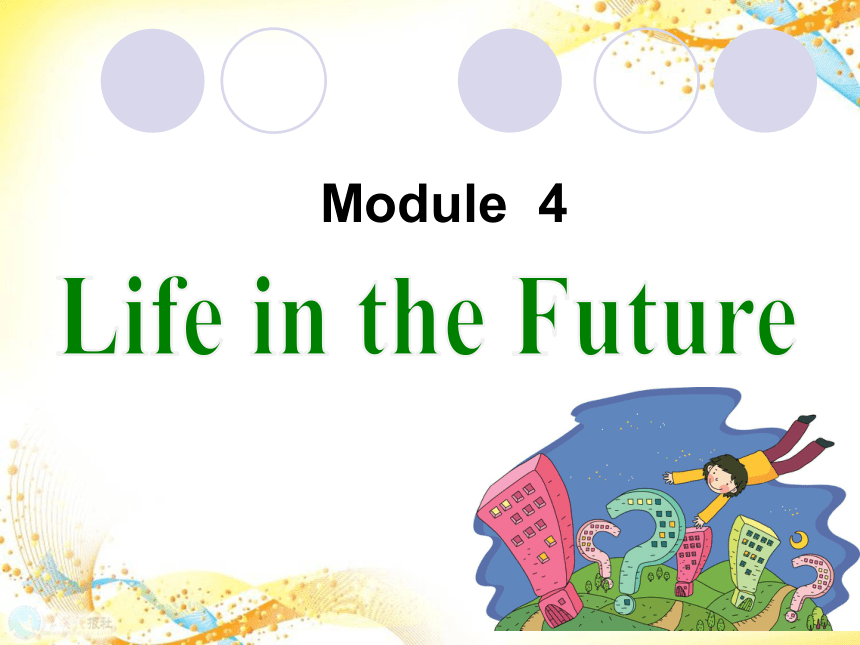
|
|
| 格式 | zip | ||
| 文件大小 | 2.1MB | ||
| 资源类型 | 教案 | ||
| 版本资源 | 外研版 | ||
| 科目 | 英语 | ||
| 更新时间 | 2014-11-01 18:31:21 | ||
图片预览


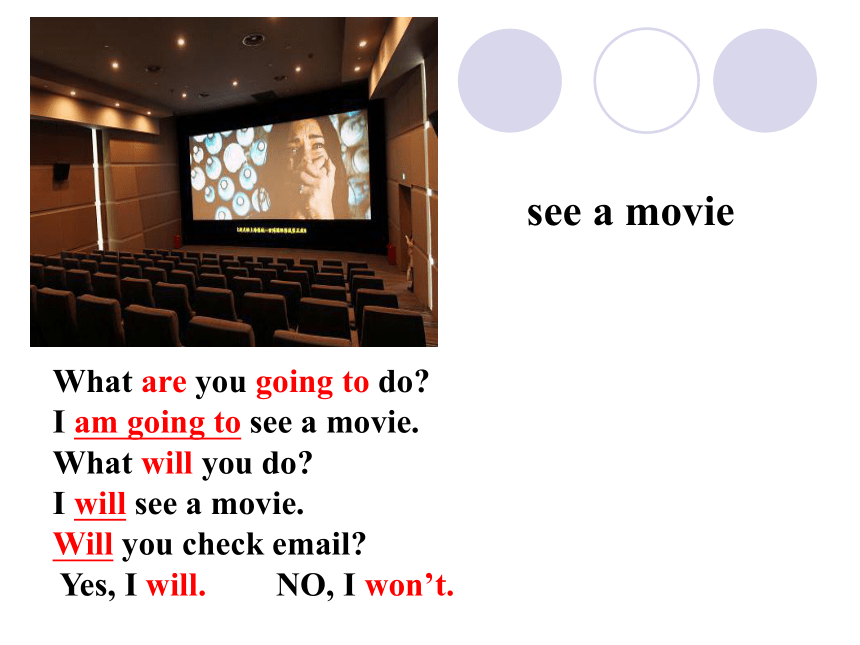
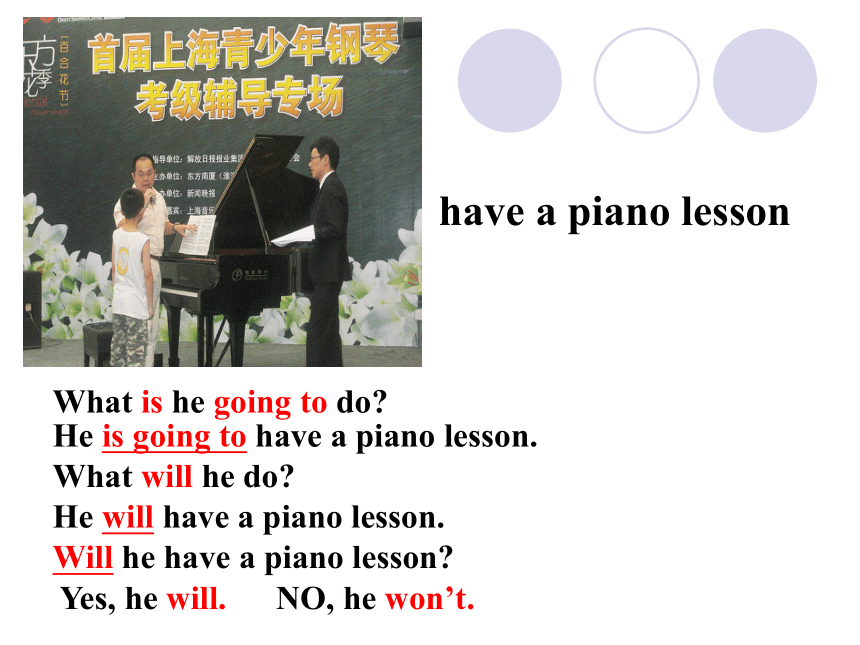
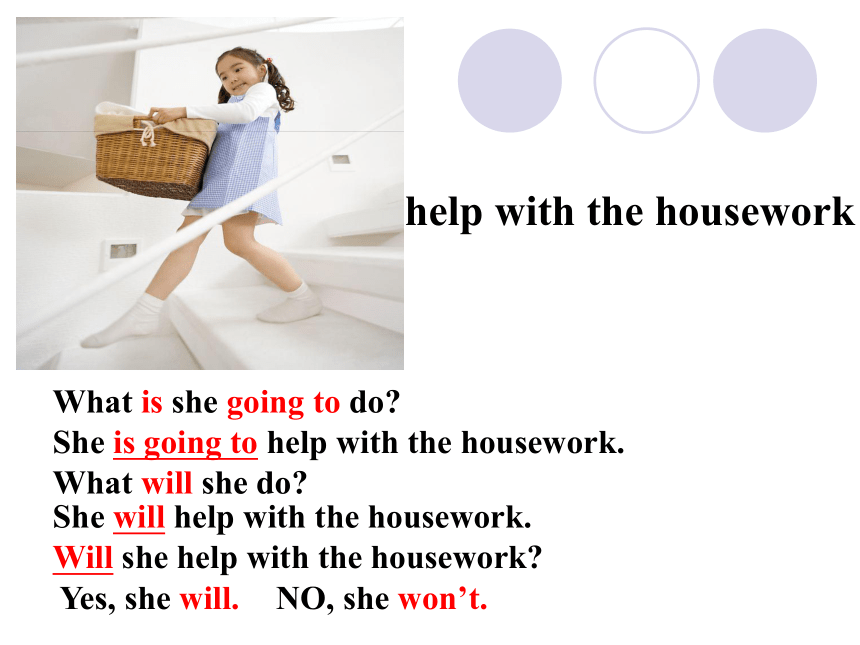

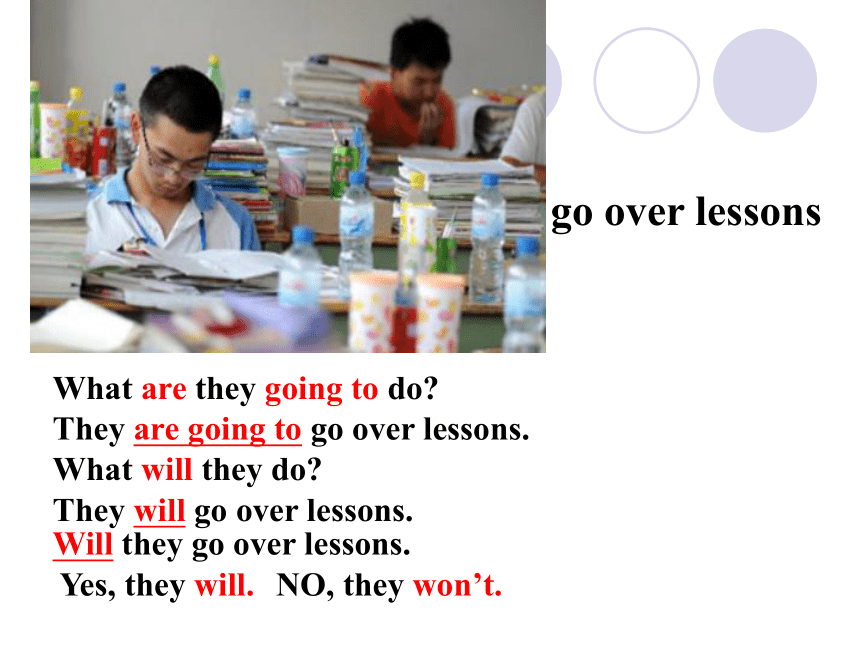
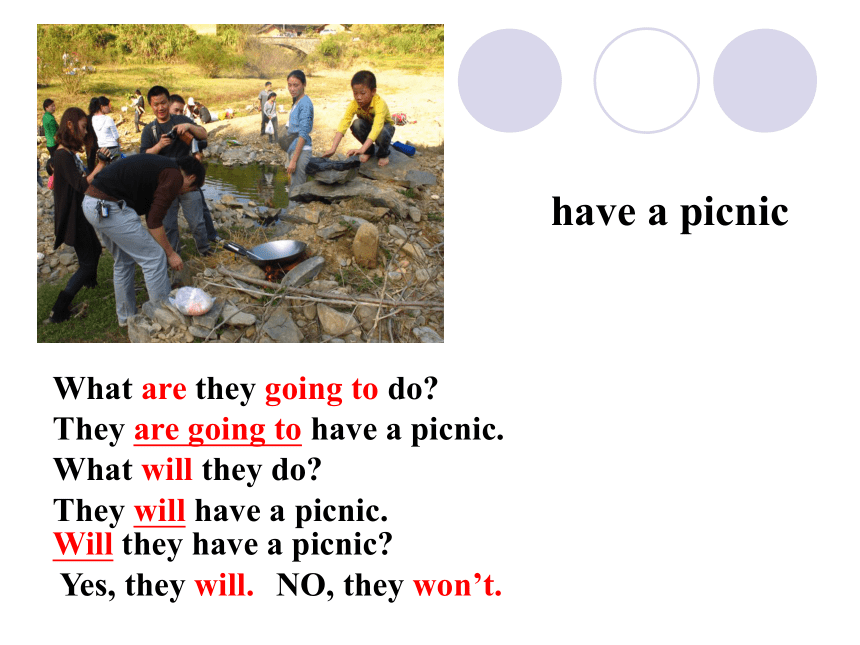
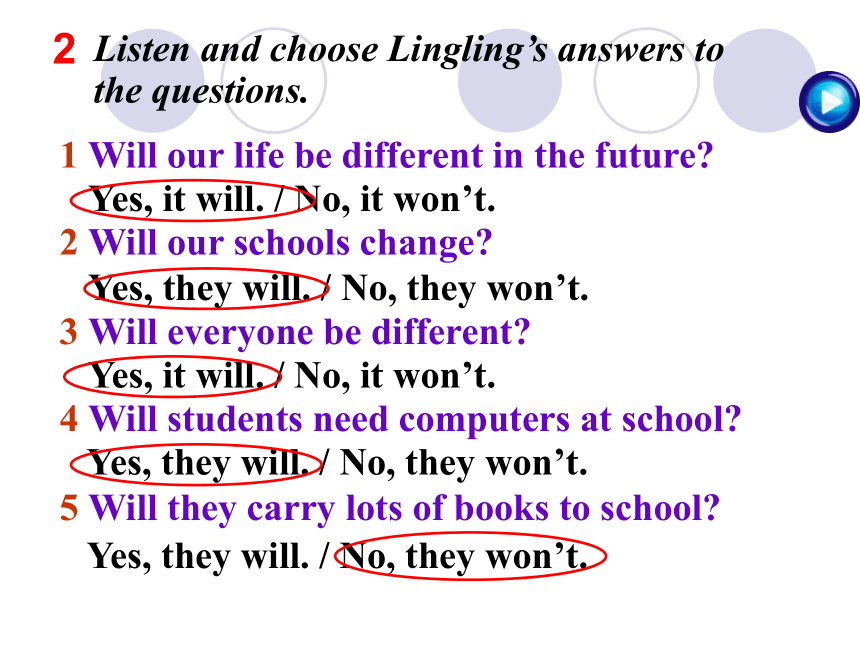
文档简介
课件29张PPT。Life in the FutureModule 4Everyone will study at home.Unit 1see a movieI am going to see a movie. What are you going to do? What will you do? I will see a movie. Will you check email? Yes, I will.NO, I won’t.have a piano lessonHe is going to have a piano lesson. What is he going to do? What will he do? He will have a piano lesson. Will he have a piano lesson? Yes, he will.NO, he won’t.help with the houseworkShe is going to help with the housework. What is she going to do? What will she do? She will help with the housework. Will she help with the housework?Yes, she will.NO, she won’t.check emailShe is going to check email. What is she going to do? What will she do? She will check email. Will she check email? Yes, she will.NO, she won’t.go over lessonsThey are going to go over lessons. What are they going to do? What will they do? They will go over lessons. Will they go over lessons. Yes, they will.NO, they won’t.have a picnicThey are going to have a picnic. What are they going to do? What will they do? They will have a picnic. Will they have a picnic? Yes, they will.NO, they won’t.Listen and choose Lingling’s answers to the questions.1 Will our life be different in the future?
Yes, it will. / No, it won’t.
2 Will our schools change?
Yes, they will. / No, they won’t.
3 Will everyone be different?
Yes, it will. / No, it won’t.
4 Will students need computers at school?
Yes, they will. / No, they won’t.
5 Will they carry lots of books to school?
Yes, they will. / No, they won’t. 2What will the school be like in the future?Nowschool in the futureWhat is the school like now?
Listen to the tape and answer the questions.
1.Will schools be different in the future?
Yes, they will.
2.Will students use pens or paper in the
future?
No, they won’t.
3.Will students have a lot of free time in the future?
Yes, they will.1. In 20 years’ time, maybe there won’t be any schools!二十年之后,也许一所学校都没有了!
“in+一段时间”表示 “一段时间之后”,常用于将来时。Language points2. They can ask their teachers questions by
Internet, telephone or email.
他们可以通过网络,电话或是电子邮件
问老师问题。 I go to school by bike every day.
我每天骑自行车去上学。
My sister will go to Germany by plane. 我妹妹将坐飞机去德国。 介词by表示方法、方式, 意思是“通过……,靠……”。 by后面直接跟单数名词, 且不加冠词。Read the dialogue. Now check the students’ ideas about the future.√√3. Computers won’t be able to do that.
计算机无法胜任。
be able to “能够,会,胜任”,相当于can,但是可以用于更多的时态之中,例如:
I’m able to swim. = I can swim. 我会游泳。
They will be able to tell you the news soon.
她们很快就能告诉你这个消息了。Read the dialogue. Now check the students’ ideas about the future.√√√4. Teachers won’t use chalk on a blackboard and students won’t use pens and paper, or erasers any more!老师们将不再用粉笔在黑板上写字,学生们也将不再使用钢笔、纸或橡皮!
not…any more的意思是“不再”,例如:
She isn’t a child any more.
她不再是小孩子了。
I won’t do that any more.
我再也不那样做了。Read the dialogue. Now check the students’ ideas about the future.√√√√Complete the passage with the correct form of the words and expression from the box.4able any more free level maybe
need question telephoneBetty: We’ll always (1)_______ teachers because computers will never be (2) _____ to check the students’(3) _________ and answer their (4)________ by (5)________
or Internet. Will students need to go to school (6)___________? Yes, (7)_______ they will, because school is good fun, but everyone will have lots of (8) _________ time.needablelevelquestionstelephoneany moremaybefree Schools in the future
1. study at home
will 2. use computers and get information on the
Internet
3. ask teachers questions by Internet, telephone
or email
won’t 1. use pens and paper, or erasers
2. use chalk on a blackboard
Students will study at home. They will use computers and get information on the Internet. They will ask teachers questions by Internet, telephone or email. They won’t use pens and paper, or erasers any more. The teachers won’t use use chalk on a blackboard.
The future schoolListen and repeat./ju:/ future student use
/?/ but fun study us
/u:/ ruler
/?/ put6
一般将来时: 用来表达未来的事实或对将来的预测等。
谓语构成:will + 动词原形 “将做某事”
肯定句 :主语 + will + 动词原形
1、将来每个人都将使用电脑。
Everyone __________ computers in
the future.
2、我们将会在家里学习。
We _________ at home.Grammarwill usewill studyGrammar否定句:
主语 + will + not(won’t) + 动词原形
“将不会 … ”
1、学生们将不再使用书了。
Students ___________________ books.
2、老师们将不再用粉笔在黑板上写字。
Teachers ___________________ on
the blackboard with chalk.will not/won’t use will not/won’t writeGrammar一般疑问句:
Will + 主语 + 动词原形?
肯定回答:Yes, 主语+ will .
否定回答:No, 主语+ will not / won’t.
1、- 将来每个人都有一台电脑在书桌上吗?
- 是的。
— ______ everyone _____ a computer on their desks?
— Yes, they _____ .
2、-将来会有学校吗? -没有。
— _____ there _____ schools in the future?
— No, there ______ . Will havewillWill bewon’t
will (第一人称)+动词原形
常见的时间状语:next Tuesday
next week
the coming Sunday
next year
this afternoon
tomorrow
tonight
in a few minutes
in the future
in five years没有人称和数的变化“There be”句型的一般将来时
肯定句: There will be +名词+其他成份
[注意]:无论后面加单数名词或复数形式,be都必须用原形。
There will be only one country.
否定句:在will后面加not.
There won’t be only one country.
一般疑问句:把will提到there之前。
Will there be only one country?
Yes, there will. / No, there won’t.Homework
Workbook Module 4 Unit 1.
2. Design(设计) a school for the future and write it down.Thank you!
Yes, it will. / No, it won’t.
2 Will our schools change?
Yes, they will. / No, they won’t.
3 Will everyone be different?
Yes, it will. / No, it won’t.
4 Will students need computers at school?
Yes, they will. / No, they won’t.
5 Will they carry lots of books to school?
Yes, they will. / No, they won’t. 2What will the school be like in the future?Nowschool in the futureWhat is the school like now?
Listen to the tape and answer the questions.
1.Will schools be different in the future?
Yes, they will.
2.Will students use pens or paper in the
future?
No, they won’t.
3.Will students have a lot of free time in the future?
Yes, they will.1. In 20 years’ time, maybe there won’t be any schools!二十年之后,也许一所学校都没有了!
“in+一段时间”表示 “一段时间之后”,常用于将来时。Language points2. They can ask their teachers questions by
Internet, telephone or email.
他们可以通过网络,电话或是电子邮件
问老师问题。 I go to school by bike every day.
我每天骑自行车去上学。
My sister will go to Germany by plane. 我妹妹将坐飞机去德国。 介词by表示方法、方式, 意思是“通过……,靠……”。 by后面直接跟单数名词, 且不加冠词。Read the dialogue. Now check the students’ ideas about the future.√√3. Computers won’t be able to do that.
计算机无法胜任。
be able to “能够,会,胜任”,相当于can,但是可以用于更多的时态之中,例如:
I’m able to swim. = I can swim. 我会游泳。
They will be able to tell you the news soon.
她们很快就能告诉你这个消息了。Read the dialogue. Now check the students’ ideas about the future.√√√4. Teachers won’t use chalk on a blackboard and students won’t use pens and paper, or erasers any more!老师们将不再用粉笔在黑板上写字,学生们也将不再使用钢笔、纸或橡皮!
not…any more的意思是“不再”,例如:
She isn’t a child any more.
她不再是小孩子了。
I won’t do that any more.
我再也不那样做了。Read the dialogue. Now check the students’ ideas about the future.√√√√Complete the passage with the correct form of the words and expression from the box.4able any more free level maybe
need question telephoneBetty: We’ll always (1)_______ teachers because computers will never be (2) _____ to check the students’(3) _________ and answer their (4)________ by (5)________
or Internet. Will students need to go to school (6)___________? Yes, (7)_______ they will, because school is good fun, but everyone will have lots of (8) _________ time.needablelevelquestionstelephoneany moremaybefree Schools in the future
1. study at home
will 2. use computers and get information on the
Internet
3. ask teachers questions by Internet, telephone
or email
won’t 1. use pens and paper, or erasers
2. use chalk on a blackboard
Students will study at home. They will use computers and get information on the Internet. They will ask teachers questions by Internet, telephone or email. They won’t use pens and paper, or erasers any more. The teachers won’t use use chalk on a blackboard.
The future schoolListen and repeat./ju:/ future student use
/?/ but fun study us
/u:/ ruler
/?/ put6
一般将来时: 用来表达未来的事实或对将来的预测等。
谓语构成:will + 动词原形 “将做某事”
肯定句 :主语 + will + 动词原形
1、将来每个人都将使用电脑。
Everyone __________ computers in
the future.
2、我们将会在家里学习。
We _________ at home.Grammarwill usewill studyGrammar否定句:
主语 + will + not(won’t) + 动词原形
“将不会 … ”
1、学生们将不再使用书了。
Students ___________________ books.
2、老师们将不再用粉笔在黑板上写字。
Teachers ___________________ on
the blackboard with chalk.will not/won’t use will not/won’t writeGrammar一般疑问句:
Will + 主语 + 动词原形?
肯定回答:Yes, 主语+ will .
否定回答:No, 主语+ will not / won’t.
1、- 将来每个人都有一台电脑在书桌上吗?
- 是的。
— ______ everyone _____ a computer on their desks?
— Yes, they _____ .
2、-将来会有学校吗? -没有。
— _____ there _____ schools in the future?
— No, there ______ . Will havewillWill bewon’t
will (第一人称)+动词原形
常见的时间状语:next Tuesday
next week
the coming Sunday
next year
this afternoon
tomorrow
tonight
in a few minutes
in the future
in five years没有人称和数的变化“There be”句型的一般将来时
肯定句: There will be +名词+其他成份
[注意]:无论后面加单数名词或复数形式,be都必须用原形。
There will be only one country.
否定句:在will后面加not.
There won’t be only one country.
一般疑问句:把will提到there之前。
Will there be only one country?
Yes, there will. / No, there won’t.Homework
Workbook Module 4 Unit 1.
2. Design(设计) a school for the future and write it down.Thank you!
同课章节目录
- Module 1 Lost and found
- Unit 1 Whose bag is this?
- Unit 2 Are they yours?
- Unit 3 Language in use
- Module 2 What can you do ?
- Unit 1 I can play the piano
- Unit 2 I can run really fast
- Unit 3 Language in use
- Module 3 Making plans
- Unit 1 What are you going to do at the weekends?
- Unit 2 We're going to cheer the players.
- Unit 3 Language in use
- Module 4 Life in the future
- Unit 1 Everyone will study at home
- Unit 2 Every family will have a small plane.
- Unit 3 Language in use
- Module 5 Shopping
- Unit 1 What can I do for you?
- Unit 2 You can buy everything on the Internet
- Unit 3 Language in use
- Module 6 Around town
- Unit 1 Could you tell me how to get to the Nationa
- Unit 2 The London Eye is on your right.
- Unit 3 Language in use
- Revision module A
- Module 7 My past life
- Unit 1 I was born in a small village.
- Unit 2 I was born in Quincy.
- Unit 3 Language in use
- Module 8 Story time
- Unit 1 Once upon a time….
- Unit 2 Goldilocks hurried out of the house.
- Unit 3 Language in use
- Module 9 Life history
- Unit 1 He left school and began work at the age of
- Unit 2 He decided to be an actor.
- Unit 3 Language in use
- Module 10 A holiday journey
- Unit 1 What did you do?
- Unit 2 This morning we took a walk.
- Unit 3 Language in use
- Module 11 Body language
- Unit 1 They touch noses!
- Unit 2 Here are some ways to welcome them.
- Unit 3 Language in use
- Module 12 Western music
- Unit 1 It's so beautiful!
- Unit 2 Vienna is the centre of European classical
- Unit 3 Language in use
- Revision module B
